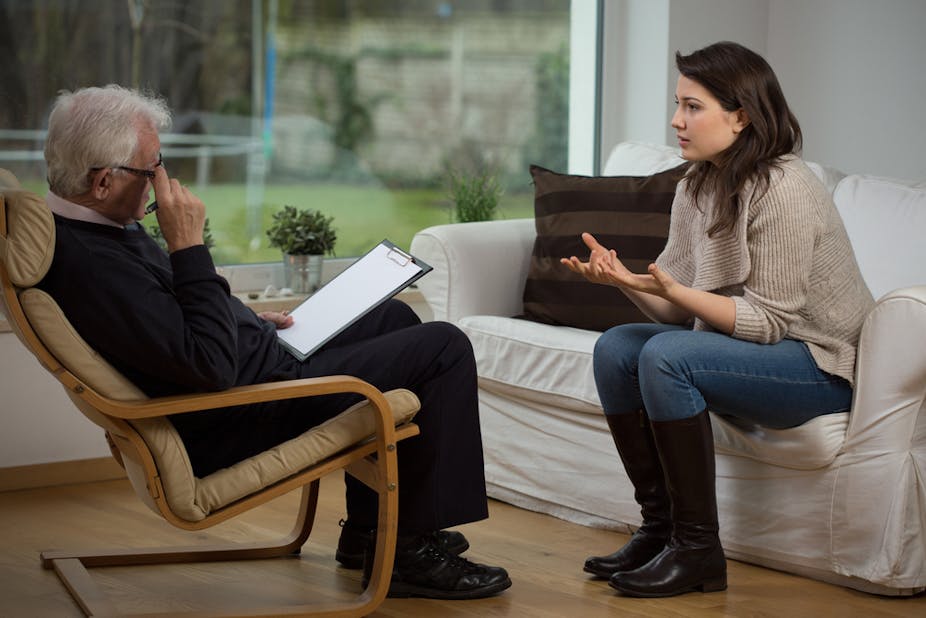The National Institute for Health and Care Excellence (NICE) has become a byword for unbiased, evidence-based healthcare advice. Its recommendations strongly influence which treatments are made available on the NHS. We wouldn’t expect NICE to make recommendations that are unsupported by evidence or, worse, contain contradictory evidence. However, two recent NICE publications recommend psychological therapies for bipolar disorder and schizophrenia despite a lack of robust evidence for their effectiveness.
Bipolar disorder
The NICE guideline for bipolar disorder recommends psychological therapy for adults who are seeing their GP for treatment. And for those being treated in hospital, NICE puts psychotherapy on a par with drugs, such as antidepressants and lithium. We recently published a paper in Lancet Psychiatry reassessing the evidence used by NICE in the guideline.
NICE recommendations are mainly based on evidence from studies known as meta-analyses. A meta-analysis is where data from several studies are combined and analysed in order to arrive at more reliable estimates of treatment effects.
The first thing that struck us about the NICE guideline was the sheer number of meta-analyses performed. There were over 170 – but they used just 55 trials, meaning that most analyses contained very few trials and many of the analyses were looking at the same trials. The largest meta-analysis looked at just six trials, but even more worryingly, over half of all meta-analyses in the NICE guideline looked at a single trial. This form of “data mining” contradicts the purpose of meta-analysis. And such an approach inevitably reduces the probability of obtaining reliable findings and increases the possibility of false discoveries.
NICE recommends a number of therapies for the treatment of bipolar disorder, including cognitive behavioural therapy (CBT). Six of their meta-analyses tested whether CBT reduces the symptoms of depression in bipolar disorder – but the results were mixed. One analysis reported a significant reduction of depressive symptoms at the end of therapy. But another showed that improvements disappeared after therapy ended. Two other studies found that CBT is less successful at reducing depression than an “active control”, such as supportive counselling, which has no known therapeutic effect.
NICE assessed the quality of the psychological therapy trials used in these metanalyses and almost all (96%) were rated “low” or “very low” quality. The remaining 4% were rated “moderate”. We might think then that NICE would have been cautious when interpreting the findings, especially since low-quality studies often inflate the reported effects. Unfortunately, this wasn’t the case. Indeed, where high-quality evidence was not available, the guide says that the committee adopted “an informal consensus process”. In other words, NICE shifted from evidence to opinion.

Schizophrenia
Turning to schizophrenia, NICE has repeatedly made strong claims for the effectiveness of CBT. In their 2009 guideline, the agency recommended that doctors: “Offer CBT to all people with psychosis or schizophrenia”. Similar data mining is apparent in this guideline, with 110 meta-analyses conducted on a mere 31 trials. Around half of the meta-analyses contain only one or two studies. There were very few positive findings and NICE didn’t pay much attention to the quality of the studies included in the guideline.
In what seems to be a major oversight, NICE decided not to update the 2014 guideline with the latest evidence. Although NICE declares that it is “committed to keeping guidelines current”, with updates undertaken every four years at least, the 2014 NICE meta-analyses contain no trials published after 2008.
A different view
In 2014, we published our own meta-analysis of all the available evidence and came to more cautious conclusions about the effectiveness of CBT at reducing the symptoms of schizophrenia. Similarly, a Cochrane Review, published in 2012, found “no clear and convincing advantage for cognitive behavioural therapy”.
These shortcomings have begun to raise concerns. A recent editorial in the British Journal of Psychiatry by Professor Mark Taylor, former chair of Scotland’s equivalent of the NICE group, said that the NICE guideline on schizophrenia “promotes some psychosocial interventions, especially CBT, beyond the evidence”.
Is NICE achieving its stated aims of unbiased and evidence-based recommendations? Or are poor-quality, unconvincing and outdated evidence being employed in the political urgency to promote psychological therapies? Some argue that psychological therapies are what people want and that they are cost effective, but both claims rely on first showing that they are effective.

